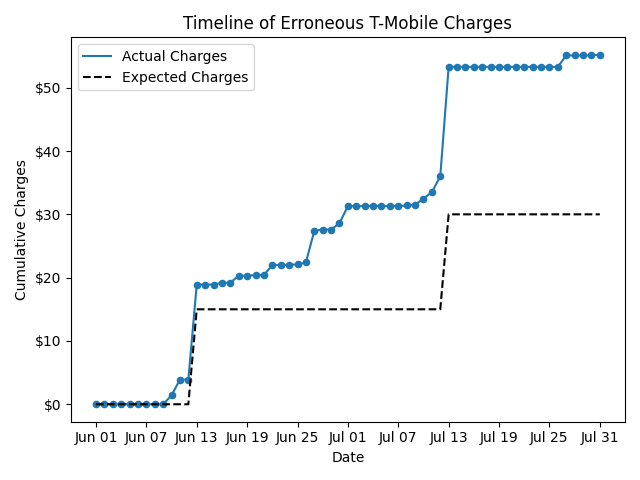I pay $15 a month for my phone bill, which grants me unlimited calls, texts, and enough data to get by. It’s more than sufficient for my needs and, frankly, a steal compared to the bloated prices of most traditional phone plans.1
So, you can imagine my surprise when I logged in one day to discover a long list of mysterious $0.10 charges on my account, all labelled as domestic texting fees. Since there’s little information online about this bug, I decided to share a summary of my story below.
TL;DR: If this happens to you, don’t waste time with tier 1 or 2 support – they can’t help. Instead, file an FCC complaint if the issue isn’t quickly resolved.
While the U.S. is notorious for its lack of consumer protection laws, phone providers are still required to respond to FCC complaints within 30 days.2 As such, they take these complaints seriously, often giving them much more attention than your average support ticket.
The issue#
Upon logging in, I noticed that my balance was significantly lower than expected. After some digging (and a bit of web scraping3), I have the following information.

A closer look revealed that the issue was tied to MMS messages and occurred only when the source or destination location was unknown or undefined. The charges could reoccur for each recipient of the message.
Some views on the website labelled these as “DomesticUsage” charges, but there was no clear reason for them, and I couldn’t replicate the issue consistently.
Support timeline#
Raising this issue with T-Mobile prompted the worst journey of customer support I’ve probably ever experienced, despite previous positive interactions. Something about this particular issue seemed to have completely broken their internal processes.4
Here’s the timeline, lifted directly from the FCC complaint:
June 10 (Phone Call): I reported service issues with receiving MMS messages. Support representatives removed blocking features from my account. Minutes later, I received the first $0.10 erroneous texting charge in my entire account history, though I did not notice this until my next bill.
July 14 (Phone Call): I noticed the overcharges and called T-Mobile. Support identified the fees as account errors and assured me that engineers would investigate and respond within three days. They never did.
July 14 (Email): I followed up via email, verifying on T-Mobile’s website that the fees were for texts to domestic recipients and should not have occurred. I further requested a root cause investigation so that the persistent issue stops reoccurring.
July 15 (Email): T-Mobile responded, falsely claiming the fees were for “out of plan” numbers or chat/conference lines and that I would have been informed of the fees when they occurred. Both claims are blatant lies, especially considering these are texting fees (not phone call fees). I replied with proof from their website showing the texts were to domestic recipients and should not incur fees. T-Mobile did not respond.
July 22 (Phone Call): I called again to follow up. Support re-escalated the issue and assured me that engineers would respond within three days. They further assured me that these fees should not re-occur. Again, engineers never reached out, and the fees continued.
July 26 (Phone Call): I experienced blocked MMS messages and called T-Mobile. Support removed the blocking but failed to address the fee issue. They assured me that engineers would respond within days. They did not, and the fees persisted.
July 26 (Email): I reached out again to complain about the support quality and reiterated that the fees were due to a T-Mobile error. T-Mobile did not respond.
As you can tell, I was understandably frustrated at the time of writing.
My FCC complaint was served to T-Mobile on August 1st. About a week later, I received a call from their “Executive Response Team”.
Executive response#
The quality of the executive support was immediately phenomenal, and they seemed just as puzzled by the situation as I was.
Surprisingly, the executive team is so far removed from the prepaid side of the business that they were essentially debugging the issue alongside me:
- They initially suspected that MMS attachments might incur extra fees. They consulted with several of their coworkers but couldn’t determine if this is expected behavior – prepaid service being “no contract” understandably complicates things.5
- They also struggled to reconcile the charges. Their internal systems didn’t match up with the amounts I was actually charged, causing significant confusion. Funnily enough, they were reviewing internal reports that weren’t client-facing, and they couldn’t access the reports I was viewing on their own website.
- Moreover, their systems only preserved complete logs for 72 hours, making it impossible to drill down to the root cause unless the issue reoccurred.
Eventually, we reviewed a spreadsheet I had compiled for the FCC complaint, and they accepted my analysis. My understanding matched most of their internal data, so they credited my account for all the erroneous fees.
The issue has not reoccurred for about a month, so it seems to have been resolved somehow.
Root cause and my original theories#
EDIT (December 2024): Many months later, a specialist from T-Mobile’s executive team reached out to explain the root cause and the engineers’ fix. My original theories were on the right track.
The problem arose from a network configuration change that accidentally left the originating source/destination locations unfilled (exactly the unknown/undefined scenario I noticed earlier in their exports). As a result, their billing system opted to apply the $0.10 charges per recipient in the worst case.
Indeed, it seems that when such network issues are resolved, engineers generally do not investigate and fix any resulting billing errors.
(Resuming August 2024 content)
Since support was never able to figure out why this occurs, I have a few theories.
Random Pay-As-You-Go Glitch: Their system might sporadically treat texts as if they were on a pay-as-you-go plan. There are similar complaints online from around the same time, so it’s possible that engineers quietly fixed the issue without informing anyone or addressing past charges.
Accidental Roaming Fees: Perhaps they’re mistakenly charging roaming fees from domestic roaming or peering agreements with other providers. These should be free, but without contractual details, it’s anyone’s guess.
Botched Porting Procedures: T-Mobile’s porting procedures might be broken, and an earlier transfer of mine was improperly processed.6 If so, texts could be routed as if they were for a non-existent postpaid account, prompting the charges.
This would also explain sporadic MMS issues I’ve experienced over the past few months, with messages occasionally being dropped or blocked with cryptic errors.
T-Mobile’s prepaid and postpaid sides are effectively separate companies due to repeated mergers, but it would be mind-boggling if they were charging themselves for internal peering.
See also and references#
If you find yourself in a similar situation, start by visiting the FCC’s FAQ page on filing a complaint.
You can also review these online threads discussing similar issues:
- “Getting random charges for MMS on my Prepaid plan (unlimited 3gb)” (December 2016).
- “Tmobile Connect Plan- Random 10 cents taken out of prepaid balance?” (September 2020)
- “Random 0.10 charges” (May 2024)
- “My mom has a legacy pay-as-you-go (prepaid) plan, but she’s getting charged at least $0.20 every day. Why?” (July 2023)
- “Legacy Pay As You Go Mysterious Random Outgoing SMS Messaging Charges (May 2024)”
In fact, I would go so far as to say that most traditional phone plans are a scam. The cheapest Verizon plan is $75/month for a single line with zero mobile hotspot data ($65/month with auto-pay). That’s five times what I pay! ↩︎
Consumers typically go through the “informal” complaint process, which can be completed online for free. A formal complaint invokes something more akin to court proceedings, has a filing fee of >$600, and usually requires legal representation. ↩︎
Surprisingly, web scraping was required because the fees were zeroed out in the website’s exports and downloads. Other reports appeared incomplete and/or out of chronological order. ↩︎
I accept that prepaid service comes with lower profit margins, and thus support quality, but this experience was nigh unbelievable. ↩︎
To be fair to them, the only details on their prepaid plan state:
This plan does not include international roaming, calling, or messaging. […]
Unlimited talk & text features for basic direct communications between 2 people; others (e.g., conference, chat lines, iMessage) may cost extra or require data allotment.
This appears to be a generic disclaimer that some texting-like features actually consume data, but it could be stretched to justify charges for group chats or MMS messages.
That said, if they were to act on this and retroactively justify the charges under this clause, it would almost certainly constitute fraud. ↩︎
Indeed, this appears to be a separate, ongoing issue for the company. See “PSA to anybody who’s ported out of T-Mobile prepaid to a non T-Mobile carrier in the past few weeks” (March 2024) and “Left T-mobile prepaid for US mobile. Now I can’t receive MMS from anyone using T-Mobile” (March 2024). ↩︎
